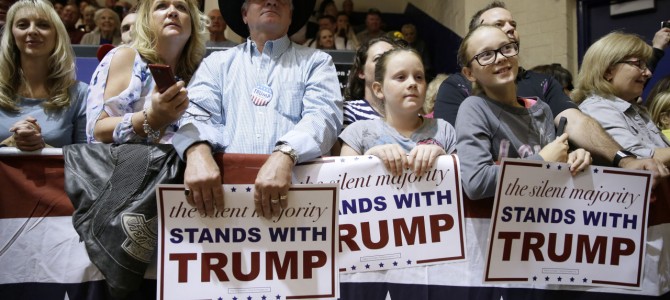
Last weekend I began rereading Gustave Le Bon’s fantastic 1895 book about the psychology of large groups, entitled “The Crowd: A Study of the Popular Mind.” The book basically offers a synopsis of the Trump — and to some extent — the Obama spectacles of the past few years. It’s filled with snippets like this one:
The masses have never thirsted after truth. … Whoever can supply them with illusions is easily their master; whoever attempts to destroy their illusions is always their victim.
And this one:
We have shown that crowds do not reason, that they accept or reject ideas as a whole, that they tolerate neither discussion nor contradiction, and that the suggestions brought to bear on them invade the entire field of their understanding and tend at once to transform themselves into acts.
And this one:
We have also seen that they only entertain violent and extreme sentiments, that in their case sympathy quickly becomes adoration, and antipathy almost as soon as it is aroused is transformed into hatred.
Whatever sparked the Trump movement, it now exhibits most of the irrational attributes of “The Crowd.” And this kind of boorish, herd mentality is human nature. Still, plenty of smart people continue spend a lot of time speculating about the movement’s deeper motivations. Rationalizing it. How many stories today, for example, will focus on the white hardscrabble working-class voter even after Trump ran away with the gray-haired retirees of Florida and the well-heeled homeowners of the Chicago suburbs?
Boy, they really suffer down in Boca.
Smart people like to theorize about Trumpism by imposing their own gripes about the GOP or trade or foreign policy or economics or whatever else they’re irritated by as proof that the GOP could have saved itself if it had only adopted some shrewder strategy. That strategy, amazingly, will almost always correspond with the views of the author. (I’m probably guilty, as well. If only Republicans had incorporated some kind of libertarian drug legalization proposal!) And because these thinkers see the “frustrations” of Trump fans as a manifestation of their clever warnings, they are sympathetic to the cause.
For the Left, Trump’s success supposedly tells us everything America needs to know about the id of the Right and the dead-end of conservatism. For a heaping dose of wishful thinking see Jonathan Chait’s piece on how conservatives openly rejected the working class: “Republican doctrine reflects the conviction that the main evil of modern government is to excessively punish the rich and reward their inferiors.”
Sure it does.
Other smart people like to make common cause with Trump as a way to show just how much they understand the “frustrations” of working and middle classes have with the establishment. So they hitch their aspirations to someone less conservative and less principled and less decent. Guess what? This is America. A man can hate all factions equally.
Other times, the professional political class seems to believe that, rather than making a compelling case of its own, it can piggyback populism by offering some watered-down progressive reforms, or maybe a slight alteration the H-1B visa program. Others, and you can see this troubling trend emerging among Republicans, believe Trump is the inevitable nominee and worth supporting because he’ll be malleable once in office.
Power-hungry egomaniacs are always more reasonable once they’ve taken control of government, I guess.
You’re free to patch together any theory you like, of course, but if you actually listen to the motivations of Trump’s core fans you will not be confused: They want to destroy you. Hang you by your fancy tie. Draw and quarter your career, and scatter the pieces from sea to shining sea. But don’t attack Trump supporters! They’re just salt of the earth, you elitist!
Unlike professional conservative activists, journalists — opinionators or otherwise — have no reason to glad-hand and empathize with 40 percent or so of Republican primary voters who aren’t dismayed by Trump’s violent rhetoric, his authoritarianism, or his self-destructive protectionism. There’s no reason to find common cause with those who don’t find the idea of a president ordering soldiers to murder the innocent families of terrorists — while countermanding American law — to be morally troublesome.
Being a working class American doesn’t mean you lack sense or morals. Those who treat you as if you did are the true elitists.
Nor do writers have any duty to be part of concerted efforts to lure back these voters. Journalists should write truths and arguments as they see them, pushing back against the whims of the mob and dumb notions its leader perpetuate. Everything in Washington disincentivizes the political class from doing this. The mass media — which drive other coverage — are incentivized to give Trump billions of dollars of unearned media, and that is only marginally better than the corrupt sites that do not merely support candidates, but act as shills for them.
“The Crowd” has taken legitimate criticisms about the GOP and transformed them into jokes, convincing itself that elected Republicans — who are often uninspiring, clueless, and spineless, but have stopped countless Obama initiatives — do absolutely nothing and always surrender. They believe that Paul Ryan and Marco Rubio are liberals but Donald Trump is a conservative worth supporting. They’ve convinced themselves that the United States is in worse shape today than it’s ever been in. The men and women of the Great Depression or the 1970s or 9/11 probably disagree.
These voters have heard about the violence, the illiberalism, and the attacks on the freedom of expression. They cheer it on. They justify it. They rationalize it. It’s not about some clause in TPP anymore. It’s a mob. If you support Trump — and I realize not every person who embraces him is paying close attention or fully understands what’s been going on — you’re an ideological opponent of limited government and liberal institutions. As Le Bon put it, “the beginning of a revolution is in reality the end of a belief.” Which sounds about right.









